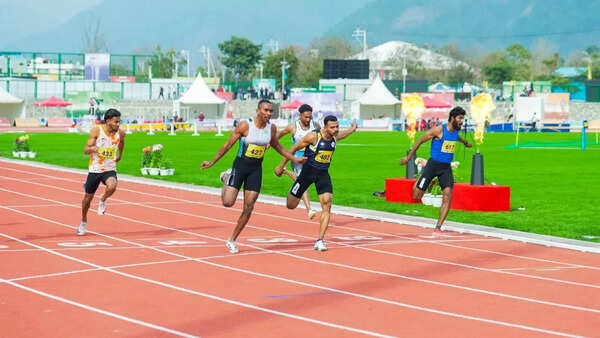Exclusive | Animesh Kujur: From the aggrieved heatstrokes to the breaking of records and India’s ‘Usain Bolt’ is more sports news

New Delhi: “Father Ri Bap (Oh My Gosh!)” – Animesh Kujur The 2025 athletics season could barely face moisture as the speed in Chennai was still increasing.Along with a host of contestants, the Indian Open Athletics Meet brought the decorating heat and stifting humidity. For 21 -year -old Odisha, it was very hot to handle it.“I really found both hetstroke before and after the events. I had to run four races in a single day and could not just stay hydrated,” Anis, Asia’s current top-ranked 200m sprinter, Animesh, said, “said,” said, ” Timesofindia.com In a free-wet chat.Go beyond the border with our YouTube channel. Subscribe now!“We did not plan hydration properly. I take training in some similar situations in Odisha, but I did not think it would be extreme.”
Fight heat
Just five days later, Anmesh The Senior Federation Cup in Kochi was due to the race. The heat of extreme Kerala made national headlines, training was out of training; Recovery he could manage all of him. “I was not sure if I would be able to perform well there,” he remembers.Still nursing fatigue, he qualified for the final and gave 20.60 seconds in semi. “I could feel that I was running at 95% of my capacity.”

The mixture required the finals, with stalwarts such as Manikanta Hobelidhar (East 100m National Record Holder) and Amlan Borgahin (East 100m and 200m National Record Holder).“I clung to my plan and worked hard in the last 100 meters. After crossing the finish line, I didn’t celebrate. I was just staring at the clock, waiting to see if I had gone less than 20.50.”Then it shone: 20.40 seconds. A new national record.

Animesh Kujur
“It felt untrue,” animesh recalls. This was followed by a familiar celebration, weapons pointed to the sky in an electric bolt, a tribute to his statue.“When I went into athletics in 2021, I knew that the only name was Usain Bolt; tall, thin, like me, even the same skin tone,” he laughs. “In the last two years, I have started leading the 100 meter and 200 meters of areas in India. Bolt has been such a great inspiration that I always try to re -create their signature currency.”
Break record
Breaking records are now a habit of Animesh. Later in April, he worked closely with Gurindarevi Singh, Manikant and Amlan at the National Relay Carnival in Chandigarh.After a training session simultaneously, the quartet gave 38.69 seconds to set a new national record in the men’s 4×100 meter relay.Animesh, who trained in Bhubaneswar, had to join Mumbai before meeting with others in Mumbai. “James Hilier Sir (Athletics Director at Reliance Foundation) helped us a lot with Baton Exchanges, Steps, The Rhythm, everything,” Animesh. “My coach, Martin OwensEverything manages: how I eat, sleep, behave, and where do I go. Just two years ago, my life was completely different. Now it is completely professional. I can feel the difference, ”he believes.
Loss of football, advantage of athletics
However, athletics was not initially not in its own plan of things, as Animesh started playing football in school.“During Kovid, I couldn’t just sit at home,” they say. He started jogging with the aspirations of the army. Someone suggested that he tries a state meeting in November 2020. Unknown it was a national qualifier, he went and surprised everyone.In January 2021, he ran his first citizens without formal training, finished fifth in both 100 meters and 200 meters. Coming from a family of police officers and defense personnel, Animesh was once urged to leave the game around the field due to future uncertainty and fear of deadly injuries: “My mother was worried about the lack of injuries and stability in the game. He asked me to leave. But my uncle and father supported me.”He recalls: “In 2022, around 12:30 pm, I was sitting outside with my father and uncle. My mother was completely against athletics. But my uncle was standing near me and said to my father, ‘Try him, man. I am with him – let’s go with him – let’s go.” That support meant everything. ,Three years later, Animesh has become one of the most talented stars in Indian athletics. As his parents now smile proudly, his son is busy taking selfies with his followers.Last week, he scored gold in 200 meters in the United Arab Emirates Athletics Grand Prix, 20.45 seconds, a new meat record and the fastest time by an Indian in an international race.
At the end of this month, he will put a line in Gumi, South Korea, which will aim for pride. Asian Athletics Championship And a ticket for the World Championship. “I want to hit in 20.20 seconds. I have already seen 20.32 – informally, but it assured me,” he says. “The qualifying mark for the world is 20.16, but I will get a gold medal in Gumi anyway. I am currently at number 1 in Asia, so the target is to be continuously.”It is going to be a long road for animals, but the sprinter certainly knows the importance of patience and perseverance, and he is away from the block.
Get IPL 2025 match schedule, squad, point table and live score for CSK, Mi, RCB, KKR, SRH, LSG, DC, GT, PBK and RR. Check the latest IPL Orange Cap and Purple Cap Standing.




